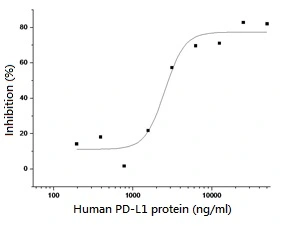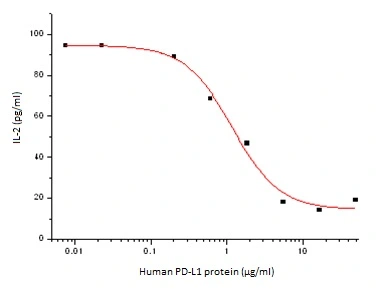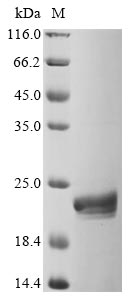
SDS-PAGE of 5 μg GTX01279-pro Human PD-L1 protein, mouse IgG1 Fc tag (active).
Human PD-L1 protein, mouse IgG1 Fc tag (active)
GTX01279-PRO
ApplicationsFunctional Assay
Product group Proteins / Signaling Molecules
Protein IDQ9NZQ7
Overview
- SupplierGeneTex
- Product NameHuman PD-L1 protein, mouse IgG1 Fc tag (active)
- Delivery Days Customer9
- Application Supplier Note1. Measured by its binding ability in a functional ELISA. Immobilized recombinant Human PD1-His protein at 10 microg/ml (100 microl/well) can bind Human PD-L1 protein (active) (GTX01279-pro) with a linear range of 1.28-20 microg/ml. 2. Measured by its ability to inhibit anti-CD3 antibody induced IL-2 secretion in human T cell lymphocytes. The ED50 for this effect is typically 0.4-3 microg/ml.
- ApplicationsFunctional Assay
- CertificationResearch Use Only
- ConjugateUnconjugated
- Protein IDQ9NZQ7
- Protein NameProgrammed cell death 1 ligand 1
- Scientific DescriptionThis gene encodes an immune inhibitory receptor ligand that is expressed by hematopoietic and non-hematopoietic cells, such as T cells and B cells and various types of tumor cells. The encoded protein is a type I transmembrane protein that has immunoglobulin V-like and C-like domains. Interaction of this ligand with its receptor inhibits T-cell activation and cytokine production. During infection or inflammation of normal tissue, this interaction is important for preventing autoimmunity by maintaining homeostasis of the immune response. In tumor microenvironments, this interaction provides an immune escape for tumor cells through cytotoxic T-cell inactivation. Expression of this gene in tumor cells is considered to be prognostic in many types of human malignancies, including colon cancer and renal cell carcinoma. Alternative splicing results in multiple transcript variants. [provided by RefSeq, Sep 2015]
- Storage Instruction-20°C
- UNSPSC12352202






